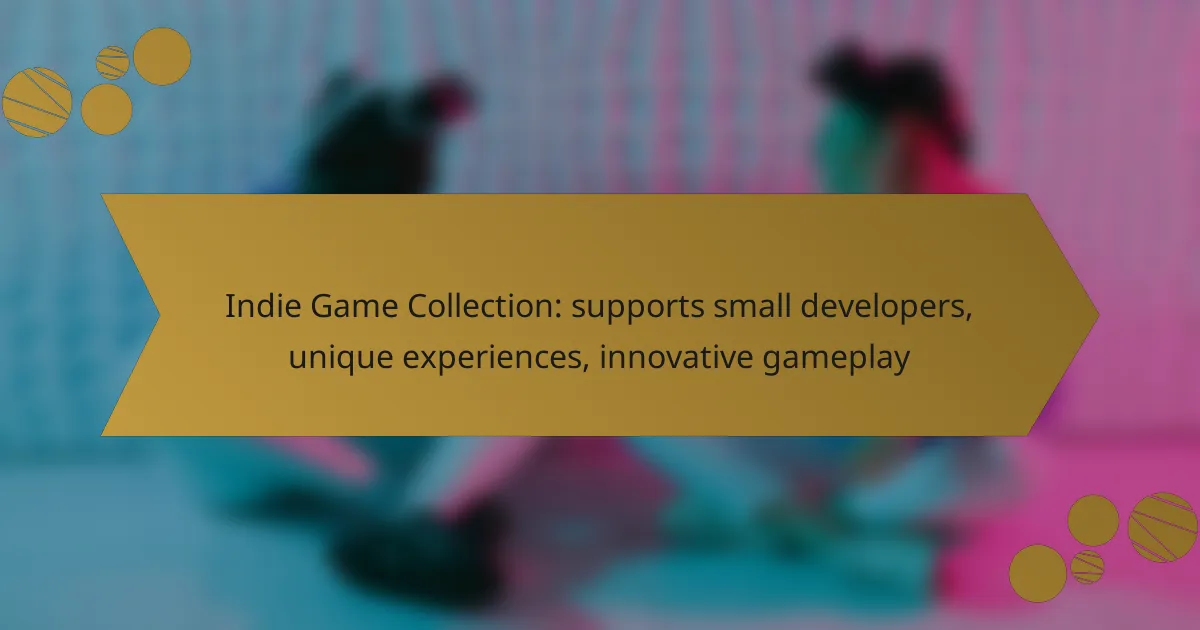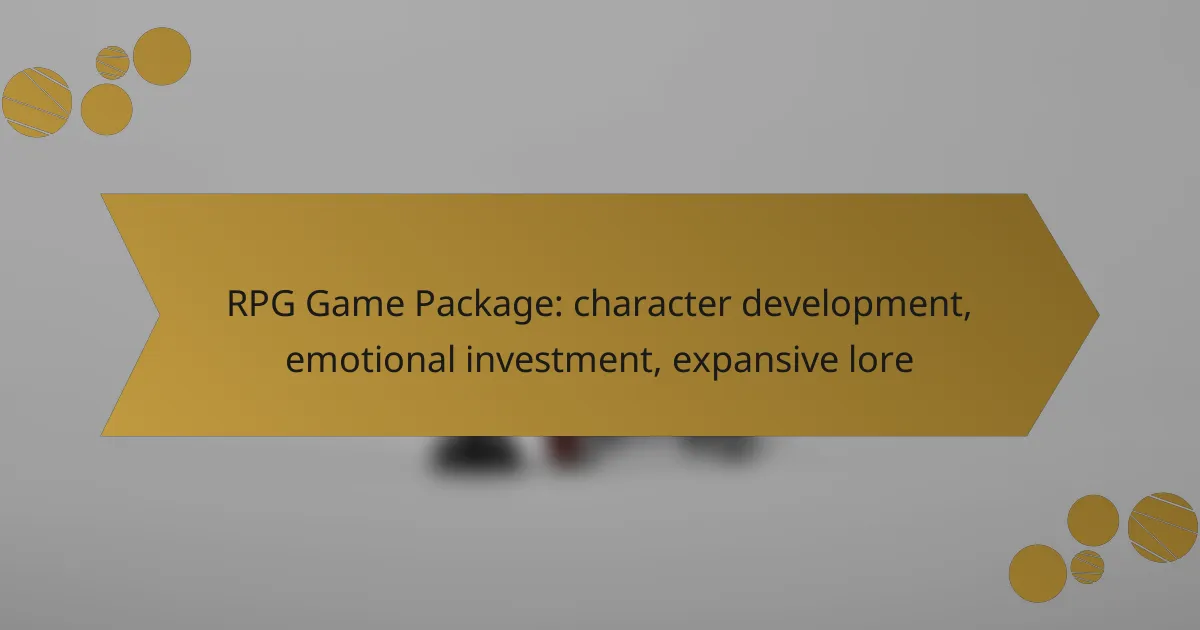Indie game collections play a vital role in supporting small developers by providing them with a platform to showcase their innovative and unique games. These collections not only enhance visibility and facilitate revenue sharing but also offer players distinctive experiences that prioritize creativity over commercial viability. By exploring unconventional themes and gameplay mechanics, indie games often deliver fresh perspectives that larger studios may overlook.
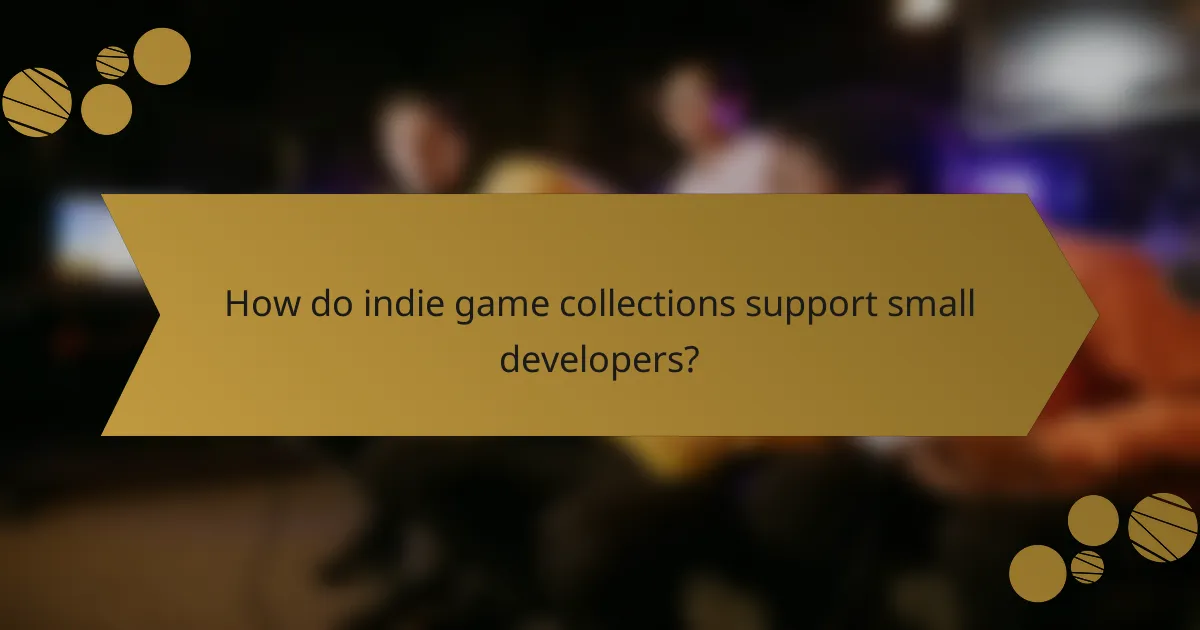
How do indie game collections support small developers?
Indie game collections provide essential support to small developers by offering them a platform to showcase their unique games and reach wider audiences. These collections often facilitate revenue sharing, enhance visibility, and enable community-driven funding, all of which are crucial for the sustainability of indie studios.
Revenue sharing models
Revenue sharing models in indie game collections typically allow developers to retain a significant portion of the sales revenue, often ranging from 70% to 90%. This is beneficial for small developers who may struggle to cover costs with traditional distribution methods that take larger cuts.
Some collections implement tiered revenue sharing, where the percentage increases as sales milestones are reached. This incentivizes developers to promote their games actively, knowing they can earn more as their titles gain traction.
Exposure to niche audiences
Indie game collections often target niche markets, providing developers with access to dedicated gamers who appreciate unique and innovative gameplay. This focused exposure helps small developers connect with audiences that are more likely to support their work.
By participating in these collections, developers can benefit from curated marketing efforts that highlight their games. This can include features in newsletters, social media promotions, and participation in themed bundles, all of which enhance visibility without requiring a large marketing budget.
Community-driven funding
Community-driven funding models, such as crowdfunding campaigns, allow indie developers to raise capital directly from their potential players. This approach not only secures funding but also builds a loyal community around the game even before its release.
Platforms like Kickstarter or Patreon enable developers to offer exclusive rewards and early access to backers, fostering a sense of ownership among supporters. This engagement can lead to valuable feedback during development and a stronger launch due to pre-existing interest.

What unique experiences do indie games offer?
Indie games provide distinctive experiences by prioritizing creativity and innovation over commercial viability. These games often explore unconventional themes, narratives, and gameplay mechanics that larger studios may overlook.
Innovative storytelling
Indie games frequently push the boundaries of narrative structure, offering players unique storytelling techniques. For instance, titles like “Undertale” and “Firewatch” use player choices to shape the story, creating a personalized experience. This approach allows for emotional depth and engagement that can be absent in mainstream games.
Many indie developers experiment with non-linear narratives, where players can explore different outcomes based on their decisions. This can lead to multiple endings, enhancing replayability and encouraging players to engage with the story from various angles.
Experimental gameplay mechanics
Indie games often introduce innovative gameplay mechanics that challenge traditional gaming norms. For example, “Braid” employs time manipulation as a core mechanic, allowing players to solve puzzles in unique ways. Such experimentation can lead to fresh and engaging gameplay experiences that stand out in a crowded market.
Developers may also blend genres, creating hybrid experiences that combine elements from different types of games. This can result in unexpected gameplay dynamics, such as mixing platforming with puzzle-solving or role-playing with strategy.
Artistic expression
Artistic expression in indie games is often reflected in their visual style and sound design. Many indie titles utilize distinctive art styles, from pixel art to hand-drawn animations, which can evoke specific moods and themes. Games like “Celeste” and “Gris” showcase how visuals can enhance storytelling and emotional resonance.
Soundtracks in indie games are equally diverse, with many developers collaborating with independent musicians to create unique audio experiences. This focus on artistic expression allows indie games to stand apart, offering players not just a game, but a work of art that resonates on multiple levels.
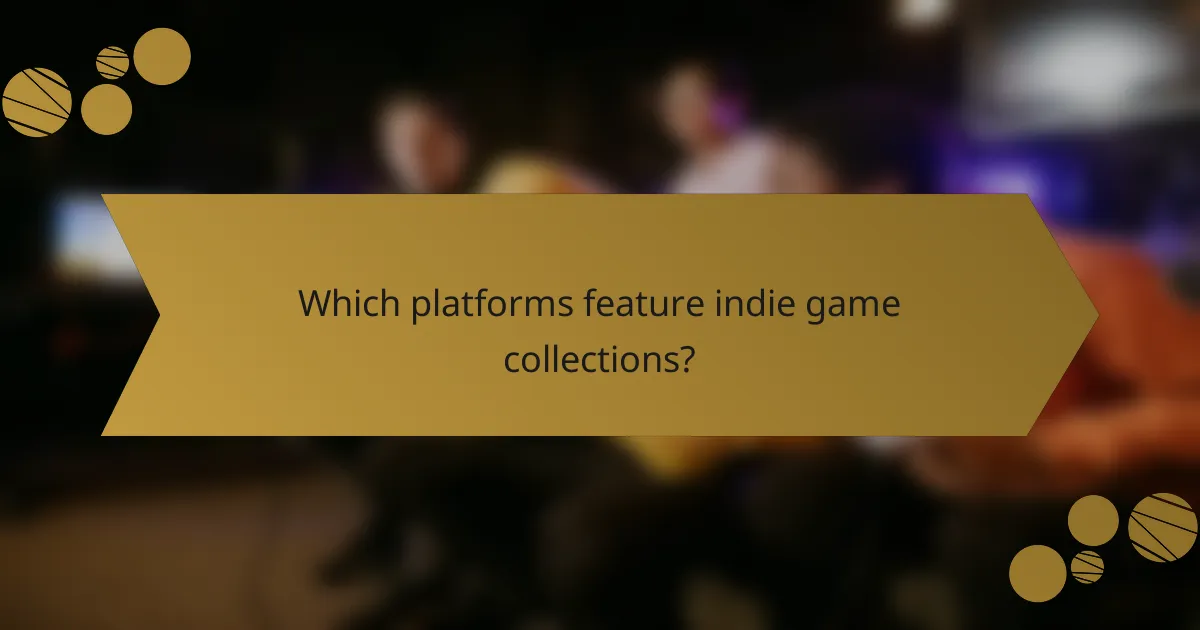
Which platforms feature indie game collections?
Indie game collections are available on various platforms, each offering unique features and experiences. Popular options include Steam, itch.io, and the Epic Games Store, which cater to different audiences and provide diverse indie titles.
Steam
Steam is one of the largest platforms for indie games, hosting a vast collection from small developers. Users can explore curated lists, seasonal sales, and user reviews to discover new titles. The platform supports various payment options and often features discounts, making it accessible for gamers.
When browsing indie collections on Steam, consider utilizing tags and categories to find games that match your interests. Look out for Steam’s “Steam Next Fest” events, where many indie developers showcase demos of upcoming releases, allowing you to try before you buy.
itch.io
itch.io is a platform dedicated to indie games, providing a space for developers to publish their work directly. It offers a pay-what-you-want model, allowing players to support developers financially according to their means. This flexibility encourages a diverse range of creative projects.
On itch.io, you can find unique experiences that may not be available on larger platforms. The site often features game jams, where developers create games within a limited time frame, resulting in innovative and experimental titles. Be sure to explore the community features, such as comments and ratings, to engage with other players and developers.
Epic Games Store
The Epic Games Store has rapidly gained popularity by offering exclusive indie titles and regular free game promotions. This platform provides a more curated selection of games, often highlighting innovative indie projects that might not receive as much attention elsewhere.
When using the Epic Games Store, take advantage of the free games offered weekly, which often include indie titles. The store’s user-friendly interface and frequent sales make it easy to discover new games. Keep an eye on their seasonal events, as they frequently showcase indie developers and their works.
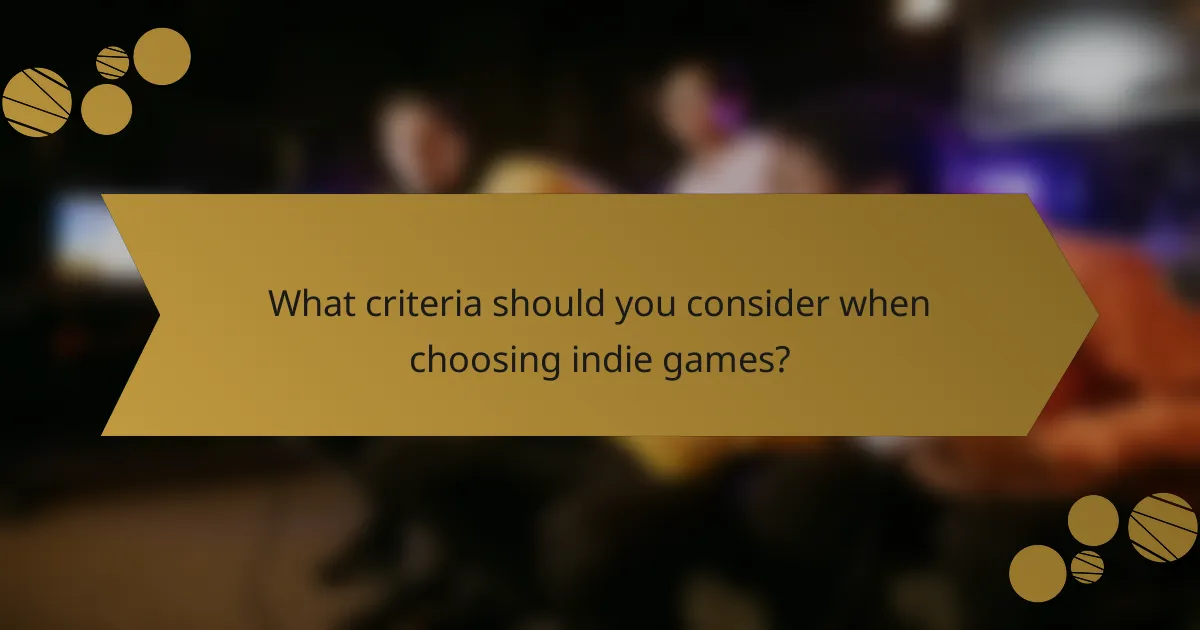
What criteria should you consider when choosing indie games?
When selecting indie games, focus on gameplay quality, the developer’s background, and community feedback. These factors can significantly influence your gaming experience and help you discover unique and innovative titles.
Gameplay reviews
Gameplay reviews provide insights into the mechanics, story, and overall enjoyment of a game. Look for reviews that highlight specific features, such as graphics, controls, and pacing, to gauge whether the game aligns with your preferences. Consider checking multiple sources to get a well-rounded view.
Pay attention to gameplay length as well; many indie games offer shorter experiences, often ranging from a few hours to around ten hours. This can be ideal for players looking for something quick yet engaging.
Developer background
The developer’s background can reveal a lot about the game’s quality and vision. Research the studio’s previous projects, their experience in the industry, and any awards or recognitions they may have received. This information can indicate their commitment to quality and innovation.
Many indie developers start as small teams or solo creators, which can lead to unique storytelling and gameplay. Understanding their journey can enhance your appreciation of the game and its creative choices.
Community feedback
Community feedback is crucial when evaluating indie games. Platforms like Steam, Reddit, and Discord often host discussions where players share their experiences and opinions. Look for common themes in feedback, such as gameplay mechanics or bugs, to make informed decisions.
Engaging with the community can also provide insights into upcoming updates or expansions, which can enhance your experience. Be wary of overly negative or overly positive reviews; aim for balanced perspectives to guide your choice.
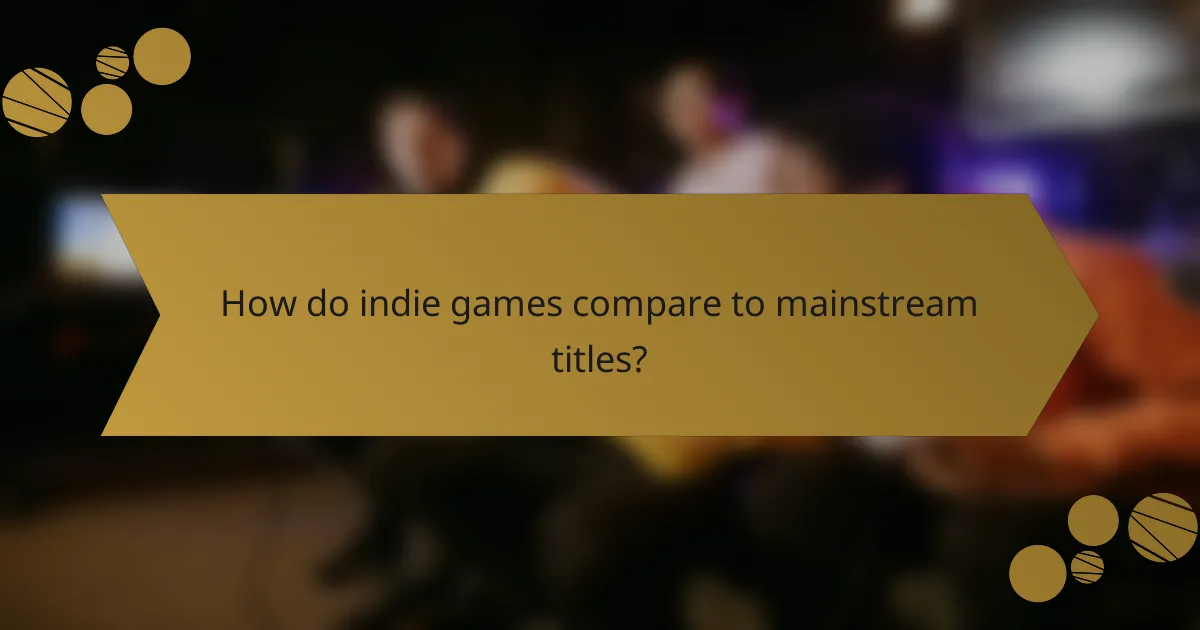
How do indie games compare to mainstream titles?
Indie games often differ from mainstream titles in terms of budget, creativity, and gameplay innovation. While mainstream games typically have larger production budgets and marketing campaigns, indie games prioritize unique experiences and experimental gameplay.
Budget constraints
Indie developers usually operate with limited budgets, often ranging from a few thousand to a couple of million dollars. This financial limitation forces them to be resourceful, leading to innovative solutions and gameplay mechanics that might not be feasible for larger studios.
For instance, many indie games utilize simple graphics or focus on storytelling rather than high-end visuals. This approach can result in engaging and memorable experiences without the need for extensive financial backing.
Creative freedom
Indie games benefit from a high degree of creative freedom, allowing developers to explore unconventional ideas and themes. Without the pressure of meeting mainstream market expectations, indie creators can take risks that may lead to groundbreaking gameplay or narratives.
Examples include games that tackle social issues or experiment with non-linear storytelling. This freedom often results in unique gameplay experiences that stand out in a crowded market, appealing to players looking for something different from typical blockbuster titles.
